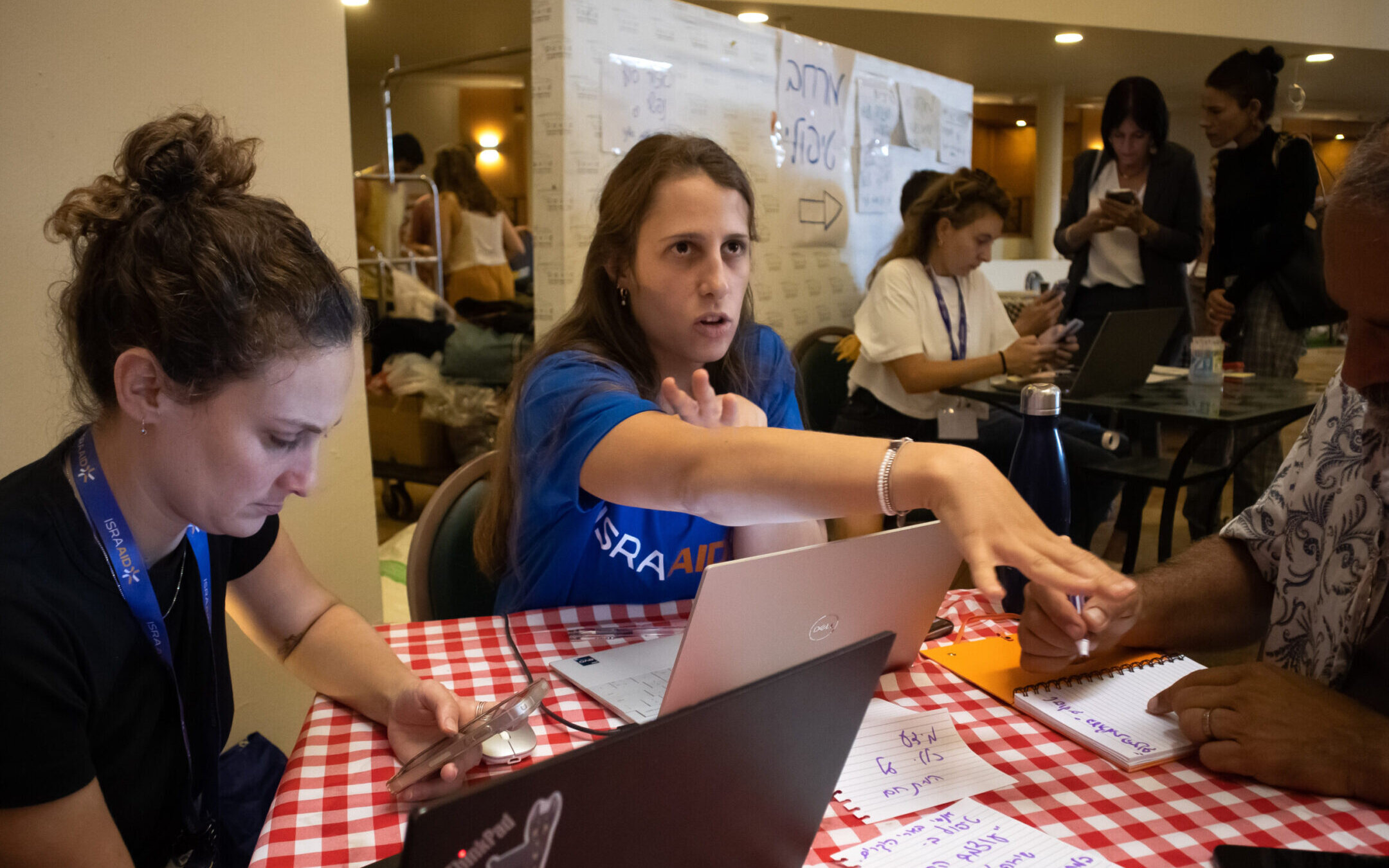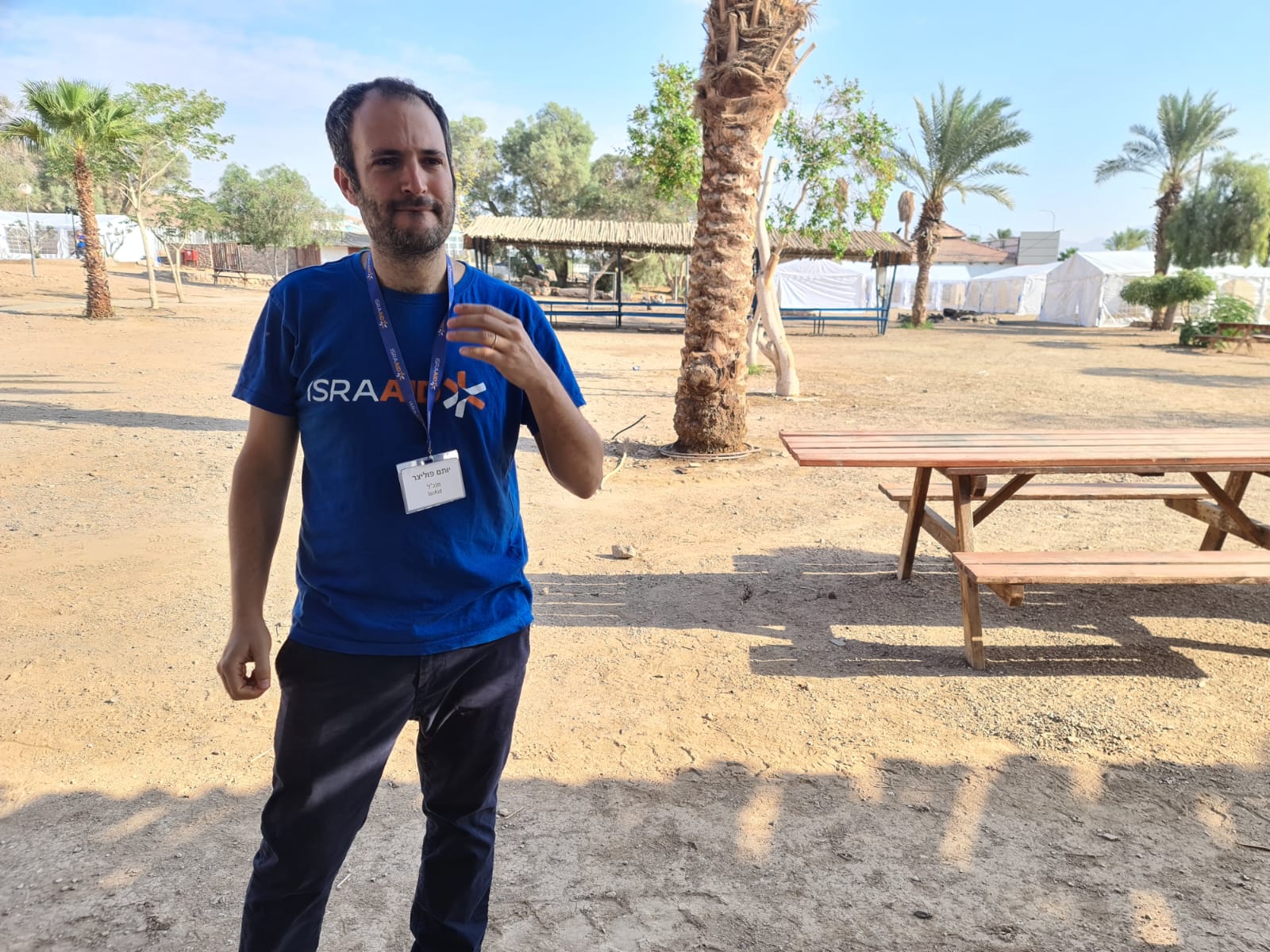Created to aid in crises abroad, these Israeli nonprofits are applying their expertise at home for the first time
IsraAID for the first time applying it expertise at home

Volunteers with IsraAID, an Israeli international aid group, staff an effort to support Israelis internally displaced after Oct. 7. (Courtesy IsraAID)
(JTA) — As community manager of his kibbutz in Israel’s south, Asaf Artel, 52, oversees all social aspects of Kissufim’s 120 member families. On Oct. 7, Artel was able to guide Israeli troops while they rescued people from the kibbutz via walkie talkie from inside his safe room, where he spent several hours with his wife and three children.
Fifteen people from the kibbutz were murdered that day; others remain missing. But within 24 hours, Artel and other kibbutz leaders were able to evacuate everyone else to safety, finding refuge at the Leonardo Plaza hotel in the Dead Sea, where they remain.
Their arrival and the ensuing day were “utter chaos,” he said. “Everyone was in trauma, everyone was in pajamas and barefoot. There was lots and lots of crying.”
Then, three days after the attack, the lobby of the hotel was suddenly filled with blue shirts of IsraAID workers. “That was the moment I knew we were in good hands,” Artel recalled.
Artel’s confidence came from personal experience. He had volunteered with IsraAID in 2016, flying to Louisiana following catastrophic flooding there, and had since been recruited for five dispatches to the United States.
Now, he has found himself on the receiving aid of IsraAID’s relief — a reflection of how intensively the Oct. 7 massacre by Hamas of Israel’s southern communities has overturned norms in Israel.
After having worked in 62 countries around the world, for the first time in its 22-year history, the organization has mobilized its resources to address a humanitarian crisis on its home soil. It is drawing from its expertise in managing complex emergencies, particularly those involving terror and displacement, to navigate the current situation in Israel.
IsraAID’s CEO, Yotam Polizer, draws parallels between the necessary relief needed in the wake of the Oct. 7 attack and other terrorism-related events, including a 2021 mission he led to evacuate 205 girls from Afghanistan following the Taliban takeover as well as a 2014 mission to assist Yazidi victims of ISIS.
“I’m not comparing exactly what they went through to what people in Israel went through, but there are definite similarities,” he told the Jewish Telegraphic Agency.

IsraAID CEO Yoram Polizer speaks about his organization’s shift to domestic aid after focusing exclusively on international crises since its founding. (Deborah Danan)
Polizer also highlights IsraAID’s proficiency in managing protracted conflict zones, such as Ukraine — one of the 16 countries where the organization is currently operating — and the emerging need for sustained humanitarian engagement.
“Without even talking about the security-political side of things, just purely from a humanitarian perspective, we’ve never had anything like it,” Polizer said, noting that his group is working to aid the families of the murdered, the thousands more who were injured, those with abducted family members, and the estimated 300,000 displaced persons.
The reason, he said, was that IsraAID understands urgent relief efforts are only the start of the process, and that the journey towards recovery and resilience is a “marathon, not a sprint.”
IsraAid is not the only Israeli nonprofit to redirect its activities home. Innovation: Africa usually applies Israeli technology to support solar energy and clean water in Africa; now, it’s deployed to help soldiers power their mobile devices and lights in the field. And NATAN Worldwide Disaster Relief, unable to send its volunteers abroad because of the war, has set up medical and dental clinics to serve Israelis evacuated from their homes in the north and south, near the front lines of conflict.
All three groups are members of OLAM, a network of 77 Jewish and Israeli organizations working in the fields of global service, international development and humanitarian aid. OLAM decided to work as one with a different network of Israeli development groups, SID-Israel, because of the unprecedented nature of the current crisis, according to OLAM’s CEO, Dyonna Ginsburg. Neither network had ever played a role during a crisis in Israel before, she said.
“Over the past month, Israeli organizations whose raison d’etre is to respond to crises abroad have rightfully understood the unprecedented and immense needs in Israel, and deployed staff and volunteers at home,” Ginsburg said. “Remarkably, many have done so while continuing their efforts to support those abroad.”
Ginsburg said the moment had provided her with an answer to questions that she had long encountered in her work.
“Before the war, I often encountered people who questioned why Jews or Israelis should invest resources in supporting vulnerable non-Jews who live far away,” Ginsburg said. “Underlying this question is an assumption of a zero sum game: you either give to internal Jewish needs or you support universal concerns. I believe this is a false binary.”
Groups with experience in disasters abroad can bring insights that Israel can benefit from, according to Polizer, who wryly refers to the initial surge of support following humanitarian disasters as “aid festivals.” He coined the term to encapsulate the chaotic influx of well-intentioned individuals who want to help but don’t necessarily know the best ways.
“It’s such a train station of people coming and going. We knew that this would happen,” he said. “Everyone wants to send their grandmother’s socks, you know, as a donation, which is very nice, but not very helpful.”
Moreover, even volunteers with relevant expertise tend to offer short-term assistance, often leading to more harm than good, a scenario that Polizer has witnessed in disaster zones all over the world and one that is currently unfolding in Israel. He cites post-trauma mental health support as the most prominent example of this.
“There are a lot of people — even professionals — with great intentions who are coming in and talking to these people who are deeply, deeply traumatized. If that’s done very short term, or if it’s a one time intervention or debriefing process, you could actually do a lot of harm. You could create triggers for people.”
Polizer also highlights missteps made by the aid community, noting a tendency to rush into making assessments and mapping out short and long term needs.
“I’ve seen a lot of organizations all over the world who come in and write it all down and then send a full report of what is needed. But by the time they get the support, the funding, and the procurement, things have changed already, the reality has changed.”
In a perverse stroke of luck, some of those mistakes have been avoided simply because there wasn’t a heavy influx of aid groups in Israel following the attack. In the wake of humanitarian disasters, the typical protocol usually involves U.N. agencies such as OCHA, along with various international aid entities, establishing a cluster system to streamline and coordinate the response to various needs.
But that can only happen when neither the government nor the civil society has the ability to meet the basic needs of the population. In such cases, the government itself would need to request the aid, which in this case it didn’t. (JTA confirmed with Mashav, the Foreign Ministry’s development arm, that Israel had not put out such a call.)
Still, in many cases, Polizer notes, such organizations would decide to help nonetheless. Chef Jose Andres’ World Central Kitchen is bolstering IsraAID’s efforts with direct aid — in the form of providing meals — for Israel’s asylum-seeking community and the local Bedouin population that have been affected by the war. But apart from that, most of IsraAID’s partnership organizations, such as UNICEF and the WHO, are sending money in lieu of on-the-ground aid.
“A lot of them are actually sending us funding, so they’re supporting us,” he said. “They said, ‘OK, we can’t respond, they don’t need our help but we will strengthen the capacity of an organization like IsraAID.’ So we of course appreciate that.”
Around 20 NGOs are currently operating in Gaza, where the humanitarian needs are acute as Israel prosecutes its war on Hamas. The majority of Palestinians living in Gaza have been displaced from their homes in the last month, according to the United Nations.
“The other side of course is that a lot of them are focusing on the Gaza side of things,” Polizer said. “I can’t comment on whether it’s also a political decision to decide not to respond.”
He added, “I think for a lot of them it actually makes sense that we are responding and that we are the leading humanitarian organization in Israel in that space.”
The key to mitigating the common issues associated with overzealous civil or aid response, he said, is building a collaborative and trust-based recovery approach that works hand in hand with the community, and that keeps on reevaluating the needs of the hour and “filling in the gaps.”
He cites establishing an ad hoc school for the residents of Nir Yitzhak who are currently in a hotel in Eilat as the most recent example of addressing an unexpected need. The community’s leaders asked IsraAID to help open a school because the kids are “losing it,” he said.
“There was no structure for the school. So we put a tent out that is near enough to the bomb shelter. But it’s freaking hot. So you need an air conditioner. So we procured two mobile air conditioners,” he said.
“Another gap is that we don’t have teachers, because either they were drafted to reserves, or worse, they were kidnapped or murdered. Unfortunately we’re hearing these stories all the time.”
In such cases, IsraAID takes responsibility for sourcing both the teachers and the necessary funds to cover their salaries as an interim solution until Israel’s education ministry can pay their wages. “Sometimes it’s about finding really quick solutions and minimizing the bureaucracy,” Polizer said.
Immediate relief efforts prioritize children, recognizing their particular susceptibility to trauma. Yet this focus is twofold, he said: by supporting children, it also grants parents the space to “breathe and start taking stock of their lives and look at the next steps.”
Artel agrees. “Before you can make a routine, you need an education system. Because when that doesn’t work, it takes all of us out of routine. That’s what we’re doing now and it automatically releases so much of the pressure.”
This article originally appeared on JTA.org.
A message from our Publisher & CEO Rachel Fishman Feddersen

I hope you appreciated this article. Before you go, I’d like to ask you to please support the Forward’s award-winning, nonprofit journalism so that we can be prepared for whatever news 2025 brings.
At a time when other newsrooms are closing or cutting back, the Forward has removed its paywall and invested additional resources to report on the ground from Israel and around the U.S. on the impact of the war, rising antisemitism and polarized discourse.
Readers like you make it all possible. Support our work by becoming a Forward Member and connect with our journalism and your community.
— Rachel Fishman Feddersen, Publisher and CEO






















